Venezuela’s oil crisis destabilises Colombian black markets
The crash in illicit fuel trade left thousands of people unable to make a living, say Colombian police.
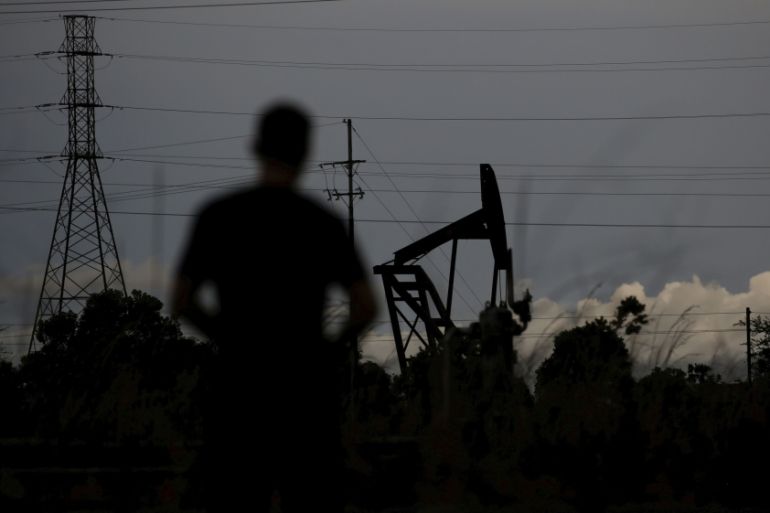
The business was just as lucrative as trafficking cocaine.
When criminal gangs sold undocumented fuel on the black market in Colombia, they could net profits upwards of a thousand percent.
Keep reading
list of 4 itemsFive takeaways from day 15 of Donald Trump’s New York hush-money trial
Trump’s lawyer presses Stormy Daniels on day 14 of hush money trial
Why is the US blocking some bomb shipments to Israel? All you need to know
And the profits were there for the taking. In 2017, Colombian authorities estimated that more than 400 million gallons of petrol were smuggled into Colombia from Venezuela. Criminals involved in this black-market business could make fortunes on the illegal petrol trade. But that ended abruptly last month, when Venezuela’s oil production was crippled and electricity outages forced South America’s once-gleaming gem into darkness.
Police in Cucuta, Colombia say the crash in the illicit fuel trade left thousands of people whose livelihoods depend on the black market and informal economy unable to support themselves. It disrupted numerous local markets. And even more troubling, it created a new war between armed groups battling for control over two remaining smuggling markets. The first was exporting basic consumer goods such as food, diapers, tires, electronics and medicine into Venezuela. The second was helping demoralised Venezuelans escape the confines of their crumbling country.
Cucuta and La Guajira – both near the Venezuelan border – became so dependent on illegal petrol to meet everyday fuel demand that shortly after the black market collapsed, most service stations in these northern areas ran dry.
The economic impact
“My father bought this house with Venezuelan petrol,” Edwin Parra told Al Jazeera. He lives in Cucuta’s Trigal del Norte neighbourhood, and his family sold black-market petrol for nearly a decade. “It was a family business,” he says.
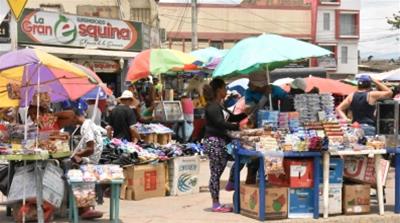
Parra estimates that half of the people in his neighbourhood worked in the black market, either as vendors, smugglers or hired hands for the paramilitary and guerrilla forces that battle to control the illicit paths across the border.
Until the recent shortages, petrol was effectively free in Venezuela. But the most recent United States sanctions have hampered the country’s ability to import the fuel it needs to dilute and process its especially heavy crude oil. This, combined with ongoing countrywide blackouts, caused Venezuelan oil production to plummet – and the cost of petrol to skyrocket.
Despite the fact that Colombia has less than one percent of its neighbour’s reserves, it now produces more oil than Venezuela.
“The collapse doesn’t only affect the 3,000 to 4,000 people who directly [sold] petrol in the streets,” says Wilfredo Canizares, director of Fundacion Progresar, a human-rights group that provides information about the Venezuelan border. “It also affects all of the people indirectly employed, as well as the local economy. And as petrol prices rise, so does the cost of food.”
This is a particular problem for La Guajira, one of the country’s poorest regions. Extreme poverty makes the residents there especially vulnerable.
From fuel to cocaine
La Guajira is known for its coca farms. Refining raw coca and turning it into cocaine requires large quantities of petrol. Twenty-eight percent of all the petrol consumed in Colombia – about 70 million gallons per year – is used for cocaine production. Before the black market in petrol collapsed, laboratories that process coca were especially dependent on that market to fulfill their needs.
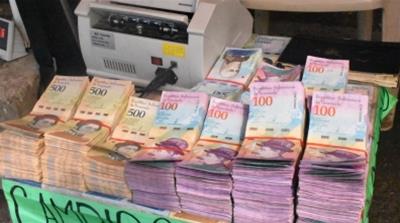
Due to the shortage, some service-station owners from the state of Norte de Santander – where petrol is government subsidised – sell their gas to cocaine laboratories in La Guajira.
Canizares says these owners work to move the petrol north with help from Cucuta’s local politicians, who receive kickbacks. As demand rises on the black market in La Guajira, he says, so does the size of these shipments.
“This has always been the case, but now it is happening on a larger scale,” notes Canizares.
Investigations conducted by InSight Crime – a foundation that studies the impact of criminality on human rights in Latin America – support Canizares’s assessment.
The battle for the ‘trochas’
Winding across the Colombia-Venezuela border are countless illegal paths or “trochas” that are controlled by three forces: Colombian paramilitaries, Venezuelan leftists known as “colectivos”, and leftist fighters from the National Liberation Army (ELN), who are originally from Colombia but who now operate in both countries. Fighting among the groups has intensified since the sizable profits from petrol smuggling dried up.
In the last month, we have received requests to find 60 people. People simply disappear in the trochas every day.
“We have seen a general decrease in crime within the city [of Cucuta],” says Colonel Jose Palomino Lopez, commander of the Cucuta Metropolitan Police. “But in the last month, we have seen a rise in extortion along the border as well as more violence in the trochas.”
Colonel Lopez told Al Jazeera that though police in the region destroy all the trochas they can, the criminals who control these paths simply carve out new ones.
Smuggling consumer goods, food, medicine, and illegal drugs into Venezuela remains a very profitable business. Venezuela officially reopened the border to pedestrians on June 7. And on June 8, Colombian immigration officials reported that 30,000 Venezuelans crossed into Cucuta – the majority of them to buy desperately needed goods before returning home.
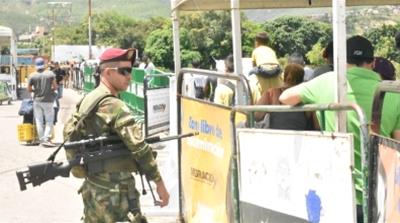
But those transporting large amounts of merchandise – either contraband or lacking official documentation – still use the smuggling paths.
Lopez says the city estimates $1.4m was spent on June 8 on consumer goods in a single area: the neighbourhood of La Parada, at the foot of the Simon Bolivar Bridge that crosses into Venezuela.
Many of those products were transported back through the trochas, where armed criminals charge 5,000 pesos ($1.60) for those passing empty-handed, and 20,000 ($6.75 USD) for each person carrying goods.
Danny Perez, 19, from Caracas, sells soda on the streets of La Parada. He is one of the thousands of informal merchants in a bustling and chaotic open-air marketplace. “Everyone here pays the vacuna [extortion price],” he says. “For little guys like me, it’s 3,000 pesos a day [about $1], but the price depends on the size of the business. The restaurants and storefront owners pay a lot more.”
On May 30th, criminals threw a grenade into a packed restaurant at lunchtime because the owner refused to pay into the protection racket. And La Parada has experienced almost monthly gun battles between the three criminal groups who battle to control a territory that police estimate generates upwards of $20,000 daily.
“Our organisation collects information and helps locate people who have disappeared trying to cross the border,” Wilfredo Canizares told Al Jazeera. “We have 900 open cases. In the last month, we have received requests to find 60 people. People simply disappear in the trochas every day.”
Sadly, most of them are never found.
Will an open border improve the situation?
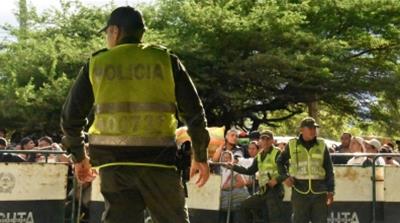
Officials hope that the opening of the border on the Venezuelan side will have a stabilising effect on the cross-border traffic. But Cucuta and its Venezuelan sister cities of San Cristobal and Urena have always had interdependent economies that rely heavily on smuggling, and that is unlikely to change.
“The fewer people cross through the illegal paths, the better,” Canizares says.
Parra says he has had enough. He and his family are headed to Santa Marta – a coastal town 700km northwest of Cucuta. “We’re leaving,” he says. “I could smuggle food into Venezuela, but it’s too dangerous. The police can’t stop the contraband. The traffickers will always find a way. They will always find something that is worth more on the other side.”